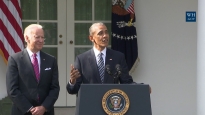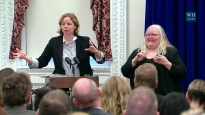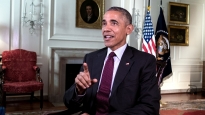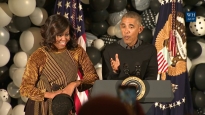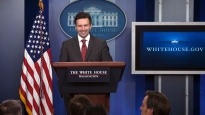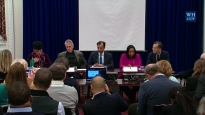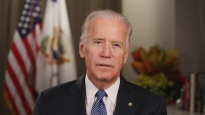Weekly Address: Winning the Future at Intel
February 19, 2011 | 4:58 | Public Domain
The President speaks from the Intel campus in Oregon about educating our kids for the jobs of tomorrow so we can make sure America wins the future.
Weekly Address: To Win the Future, America Must Win the Global Competition in Education
WASHINGTON – In this week’s address, President Obama said that the United States needs the best trained and best skilled workforce in the world to win the global competition for new jobs and industries. Over the next ten years, nearly half of all new jobs will require education beyond high school. This is why his administration has made education a top priority, enacting reforms like “Race to the Top,” working to make college more affordable, revitalizing community colleges, and launching a nationwide initiative to connect graduates to the businesses that need their skills.
The audio and video of the address will be available online at www.whitehouse.gov at 6:00 a.m. ET, Saturday, February 19, 2011.
Remarks of President Barack Obama
As Prepared for Delivery
February 19, 2011
Hillsboro, Oregon
I’m speaking to you from just outside Portland, Oregon where I’m visiting Intel, a company that helped pioneer the digital age. I just came from a tour of an assembly line where highly-skilled technicians are building microprocessors that run everything from desktop computers to smartphones.
But these workers aren’t just manufacturing high-tech computer chips. They’re showing us how America will win the future.
For decades, Intel has led the world in developing new technologies. But even as global competition has intensified, this company has invested, built, and hired in America. Three-quarters of Intel’s products are made by American workers. And as the company expands operations in Oregon and builds a new plant in Arizona, it plans to hire another 4,000 people this year.
Companies like Intel are proving that we can compete – that instead of just being a nation that buys what’s made overseas, we can make things in America and sell them around the globe. Winning this competition depends on the ingenuity and creativity of our private sector – which was on display in my visit today. But it’s also going to depend on what we do as a nation to make America the best place on earth to do business.
Over the next ten years, nearly half of all new jobs will require education beyond high school, many requiring proficiency in math and science. And yet today we’ve fallen behind in math, science, and graduation rates. As a result, companies like Intel struggle to hire American workers with the skills that fit their needs.
If we want to win the global competition for new jobs and industries, we’ve got to win the global competition to educate our people. We’ve got to have the best trained, best skilled workforce in the world. That’s how we’ll ensure that the next Intel, the next Google, or the next Microsoft is created in America, and hires American workers.
This is why, over the past two years, my administration has made education a top priority. We’ve launched a competition called “Race to the Top” – a reform that is lifting academic standards and getting results; not because Washington dictated the answers, but because states and local schools pursued innovative solutions. We’re also making college more affordable for millions of students, and revitalizing our community colleges, so that folks can get the training they need for the careers they want. And as part of this effort, we’ve launched a nationwide initiative to connect graduates that need jobs with businesses that need their skills.
Intel understands how important these partnerships can be – recognizing that their company’s success depends on a pipeline of skilled people ready to fill high-wage, high-tech jobs. Intel often pays for workers to continue their education at nearby Portland State University. As a result, one out of every fifteen of Intel’s Oregon employees has a degree from Portland State.
In fact, Intel’s commitment to education begins at an even younger age. The company is providing training to help 100,000 math and science teachers improve their skills in the classroom. And today, I’m also meeting a few students from Oregon who impressed the judges in the high school science and engineering competitions that Intel sponsors across America.
One young woman, Laurie Rumker, conducted a chemistry experiment to investigate ways to protect our water from pollution. Another student, named Yushi Wang, applied the principles of quantum physics to design a faster computer chip. We’re talking about high school students.
So these have been a tough few years for our country. And in tough times, it’s natural to question what the future holds. But when you meet young people like Laurie and Yushi, it’s hard not to be inspired. And it’s impossible not to be confident about America.
We are poised to lead in this new century – and not just because of the good work that large companies like Intel are doing. All across America, there are innovators and entrepreneurs who are trying to start the next Intel, or just get a small business of their own off the ground. I’ll be meeting with some of these men and women next week in Cleveland, to get ideas about what we can do to help their companies grow and create jobs.
The truth is, we have everything we need to compete: bold entrepreneurs, bright new ideas, and world-class colleges and universities. And, most of all, we have young people just brimming with promise and ready to help us succeed. All we have to do is tap that potential.
That’s the lesson on display at Intel. And that’s how America will win the future.
Thank you.
|
November 9, 2016
|
November 7, 2016
|
November 5, 2016
|
October 31, 2016
|
|
October 31, 2016
|
October 31, 2016
|
October 29, 2016
|
October 29, 2016
|
- &lsaquo previous
- …
- 10
- 11
- 12
- 13
- 14
- 15
- 16
- 17
- 18
- …
- next &rsaquo
